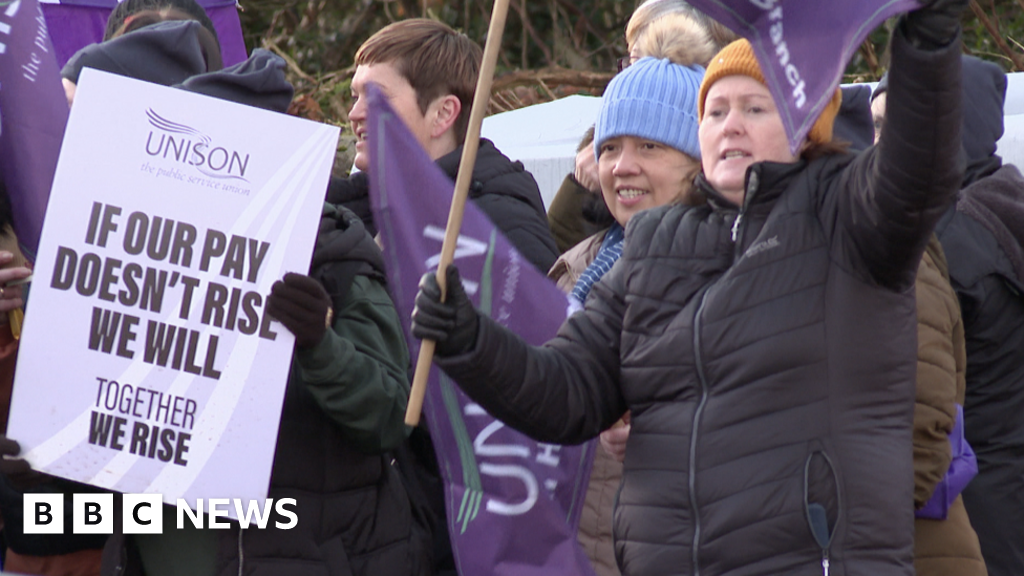- By John Campbell
- BBC News NI economics and business editor
Unison members have been on strike this year due to pay disputes
The typical full time public sector worker in Northern Ireland saw their real pay fall over 7% in the last year.
Real pay is the value of pay adjusted for inflation and is a guide to how living standards are changing.
The figures come from the official Annual Survey of Hours and Earnings (ASHE).
There is currently industrial action across public services in Northern Ireland in protest at below-inflation pay settlements.
Private sector pay increased
The ASHE figures suggest that private sector workers fared much better over the last year with typical full time pay increasing by 1.4% in real terms.
However that does not mean that all parts of the private sector saw real pay increasing, for example typical real pay in financial services was down by 11%.
Weekly earnings in the public sector (£733) were still 22% higher than in the private sector (£599), but that is the smallest difference on record.
The average gap over the last two decades was around 37%.
Image source, Getty Images
Some of the differences between the public and private sector figures are due to differences in the composition of the respective workforces
Some of the differences between the public and private sector figures are due to differences in the composition of the respective workforces.
Many of the lowest-paid occupations, such as hospitality and retail, exist almost exclusively in the private sector, while in the public sector there is a larger proportion of graduate-level and professional occupations.
When taking all jobs into account typical weekly pay for a full time worker in Northern Ireland increased by 7.4% in cash terms but fell by 0.3% in real terms over the year to April 2023.
This is the second year in a row that real pay has fallen.
The NI Statistics and Research Agency (Nisra), which produces the figures, says that when considering public and private sector earnings over the last two decades, the public sector has shown no growth in real earnings, in contrast to a growth of 13% in the private sector.
The figures suggest typical annual earnings for full-time employees in NI were £32,900 in 2023, lower than the UK median of £35,000.
Fifth lowest paid UK region
A salary of £59,000 would put someone into the top 10% of earners in Northern Ireland.
Looking across the UK’s 12 UK regions, NI experienced the second largest increase in weekly cash earnings over the year to £641 and is now the fifth lowest paid region, with London (£840) highest and the North East of England (£608) lowest.
The ASHE is a UK-wide survey of employers, based on a 1% sample of employee jobs. The data is drawn from HM Revenue and Customs’ Pay As You Earn (PAYE) records.
A rough comparison can also be made with the Republic of Ireland.
That would mean typical full time pay in the Republic is around 10% higher in cash terms compared to NI but that does not reveal the relative purchasing power of those wages on each side of the border.
Analysis: Closing gap between public and private
When you start to drill into this on a sector-by-sector basis; for example, in financial services, people there have seen a big fall in pay in real terms and those in hospitality which tends to be a lower paid sector have also seen their pay fall a bit in real terms.
It is worth saying that the typical public sector worker still gets paid more than the typical private sector worker but the difference is much smaller than it has been.
Over the past 20 years or so that premium for the public sector has been close to 40%. On the most recent figures it is getting close to 20%.

Robert Johnson is a UK-based business writer specializing in finance and entrepreneurship. With an eye for market trends and a keen interest in the corporate world, he offers readers valuable insights into business developments.








